The Mass is the source and summit of the whole Christian life. Accordingly, the Eucharist is the essential moment for building up and strengthening the parish community, along with the sacraments and other celebrations of the paschal mystery — the passion, death, and resurrection of Jesus Christ.
Sunday Mass: The Sunday Eucharist is the essential gathering of the parish community each week and is the “paradigm for other Eucharistic celebrations” (Dies Domini, 34); therefore life-giving, beautiful, and transformative celebration of Sunday Mass is critical.
Christ’s Presence: Sacramental celebrations and other parish and school liturgies are true encounters with Jesus Christ present in Word and Sacrament, in the ministry of the priest and in the gathered assembly. (Constitution on the Sacred Liturgy, 7)
Unity: As the sacrament of unity (1 Cor 10:17), celebrations of the Eucharist within the Family are opportunities for members of the parishes to worship together. The cultural traditions of the members of the Family of Parishes are honored and celebrated, particularly on special feasts.
Formation: Every Family of Parishes offers liturgical and sacramental formation “with zeal and patience” (CSL, 19), deepening an appreciation of the sacred mysteries.
Ars Celebrandi: Attention to the art of celebrating the liturgy is important: fidelity to texts and rubrics as well as a prayerful understanding of liturgical texts, feasts, and seasons kindles full, conscious, and active participation among the faithful. (Sacramentum Caritatis, 38) Preaching and music are foremost among the liturgical arts and are well-prepared for liturgical celebrations.
Trained Ministers: Priests, deacons, and lay liturgical ministers are well-trained and formed for leadership of communities at prayer and are “imbued with the spirit of the liturgy.” (CSL, 14)
Sacred Space: Churches, chapels, and other sacred buildings should be “truly worthy and beautiful, signs and symbols of heavenly realities,” the house of the Church and the house of God, “suitable for carrying out the sacred action and for ensuring the active participation of the faithful.” (General Instruction of the Roman Missal, 288)
Adoration: Adoration of the Blessed Sacrament is readily available within the Family of Parishes with proper catechesis for all.
The regular Mass schedule for a Family of Parishes may not assume more than two Masses per day per priest.
What This Means: The number of Masses scheduled in a Family must take into account the availability of the pastor and parochial vicars to celebrate them.
Why This Matters: It is important to be realistic about the availability of priests (both now and in the future), to observe canon law and to not rely on the availability of retired priests to sustain a regular Mass schedule for the Family.
A regularly scheduled Mass for the Sunday precept must have annual average attendance of at least 50 percent of the church capacity.
What This Means: If any one of the Masses celebrated in the Family on Saturday evening or Sunday morning is regularly less than half full, the Mass schedule should be reduced until all Masses regularly fill half the church building.
Why This Matters: This is another way of not only ensuring a sustainable Mass schedule but also a better quality of celebration and sense of community.
The regular Mass schedule must provide the opportunity for priests to spiritually prepare for and be present to the community after Mass.
What This Means: In creating a schedule of Masses for the Family of Parishes, consideration must be given to the driving distance and time between church buildings and other schedule demands on the priests’ time.
Why This Matters: Before Mass, priests need time to prepare not only materially (put on vestments, look over texts, etc.) but also spiritually, rather than rushing in at the last minute. In the same way, priests should have time after Mass concludes to greet worshipers and to be present to the faithful without having to immediately rush to the next place.
There must be a sufficient number of trained and formed liturgical ministers to serve as readers, servers, EMHC, music ministers, et al. for liturgical celebrations.
What This Means: Ideally, a lay liturgical minister fulfills only one ministry at any given Mass. If a Family of Parishes cannot supply the needed lay ministers on a regular basis for the regularly scheduled Masses, consider reducing the Mass schedule or recruiting more lay ministers.
Why This Matters: A full complement of well-trained and formed lay liturgical ministers is an important element of good liturgical celebrations.
Sacramental formation must be provided.
What This Means: Families of Parishes must provide appropriate formation for those who are preparing to celebrate sacraments, especially Christian Initiation (Baptism, Confirmation, first holy Communion) and Matrimony.
Why This Matters: Formation (including religious education) properly disposes the recipient to receive the grace of the sacrament. Families of Parishes should ensure that appropriate formation be offered to all parishioners in a reasonable place and time.
I am convinced that Beacons of Light, born of great hope, will enable us to form stronger parishes, centered on the Eucharist, that radiate the love of Christ and joy of the Gospel… God has abundantly blessed our first two centuries and will certainly bless the next.
— ARCHBISHOP DENNIS M. SCHNURR
